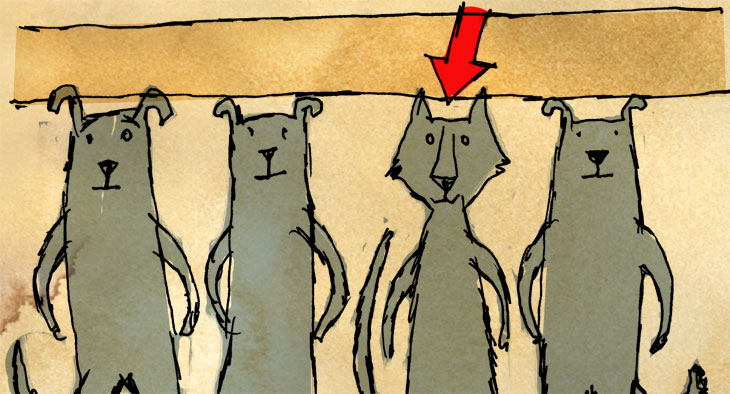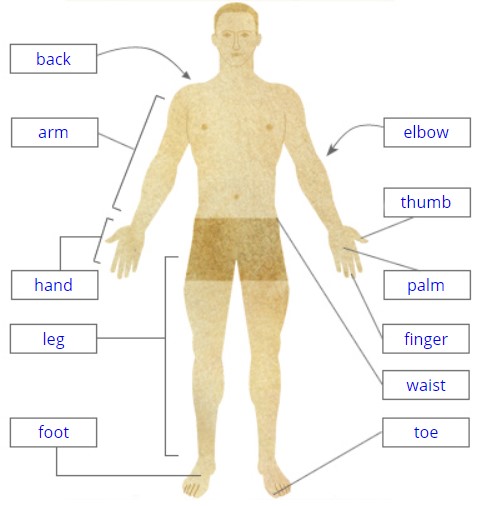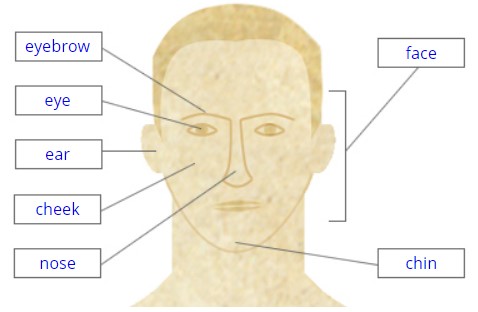1 Vocabulary: Odd one out.

An odd one out is a thing that doesn't belong in a group. There is an odd one out in each line of words below. Choose and highlight the odd one out in each line and then listen to two people talking about the correct answers.
You can see the transcript here.
3. Vocabulary: Parts of the body.
To talk about greetings and the actions involved, we use vocabulary of parts of the body. Listen and repeat the words.


Now drag the words to the correct box.
Expressions with parts of the body
There are many common expressions that use vocabulary of parts of the body. Look at the examples.
(hand = give)
Can you keep an eye on my bag?
(keep an eye on something = watch, take care of)
The village faces south.
(face = be orientated to)
This is a good rule of thumb.
(rule of thumb = a simple, practical way of doing something)
It cost an arm and a leg.
(= it was very expensive)
4. Listening: Greetings and body language.

Listen to a podcast about travelling and cultural differences. Choose the best summary for each part of the podcast.
5. Reading: Greetings and body language.

Read the transcript of the first part of the podcast. Select the best definition for each underlined word or phrase.
Podcast – Part 1
Let's begin by looking at general points and rules of thumb. When travelling in different countries it's the little things that count. Being sensitive and respectful is obviously desirable, wherever you travel. It can certainly help to observe the customs of those around you and to try to act in a similar way, using common sense and discretion. It's important to remember that you are a visitor, a guest and that the place you are visiting is the home of the people who live there and is not provided just for your own holiday amusement. Unruly, disruptive or disrespectful behaviour inevitably damages the relationship between visitors and hosts and ultimately degrades the travel experience for everyone concerned.
General tips
The following are general tips which could be considered, regardless of the country or culture of the destination. Firstly, dress. Apart from dressing for comfort, you should also consider dressing modestly and respectfully of the country that you are visiting. You don't see people walking down London's Oxford Street in bikinis, board shorts and no shirt, do you? Why should you see this in Barcelona or Istanbul?
The second general tip is about language. Make the effort to learn some of the local language and don't be afraid to use it. Any attempt at simple greetings will always be appreciated, wherever you are. The third point is about not leaving your mark. That's to say, leaving the places you visit just the way you found them. Dispose of litter correctly, including cigarette butts. Think about the effect you are having on the environment.
Last but not least, when dealing with people, stay calm, reasonable and friendly. Travelling can be stressful and things don't always go as planned; however, remembering that and taking things in your stride will definitely be to your advantage in the long run.
Now let's think about some other areas where cultural difference abounds. Let's talk about greetings.
Greetings
When you are travelling you are constantly meeting and greeting people, so, it's good to have a general idea of some of the cultural factors involved. For example, in France a polite formality is maintained in most daily encounters and transactions. "Bonjour" (good day), "merci" (thank you) and "au revoir" (farewell) are exchanged even when buying bread. Like in many countries, shaking hands is the most common for formal greetings and introductions, whereas kisses on one or both cheeks are exchanged between people who already know each other. American-style hugging is definitely not the norm in France.
In Japan polite bowing is used in greetings, thanking and saying goodbye. Bowing is a complex custom that non-Japanese people are not really expected to understand; however, as a visitor, any humble attempt at bowing will be appreciated. In general it can be done like this: men should place their hands by their waist as they bow their upper body slowly forward to not more than a 45-degree angle while keeping the back straight. Women, on the other hand, should fold their hands in front of them, in the "fig leaf" position, and bow once.
6. Listening: Personal space, behaviour and dress.

What do you think? Read the statements and mark them true or false. Then listen to Part 2 of the podcast to check your answers.
You can read the transcript here.
7. Listening: Personal space, behaviour and dress.
Can you remember what was said in the podcast? Which countries do the sentences describe?
8. Listening: Personal space, behaviour and dress.

Read and complete the next part of the podcast. Then listen and read this part.
11. Reading and listening: Coffee and meals.
Now read the last part of the podcast text and choose the best definitions for the underlined words. Then listen to the podcast and follow the text.
Coffee
The drinking of coffee is a custom that varies considerably from country to country. The ordering of coffee before or during a meal is quite unusual in southern European countries like Italy or Spain. Coffee is seen as a digestive drink and is enjoyed at the end of a meal, after dessert, but always sitting at the bar counter or at a table. In Spain and Italy, the drinking of coffee while standing in the street or walking along is considered extremely odd.
Meals
The shape and size of coffee varies in different countries, and coffees in Europe are usually much smaller than those drunk in the UK or the USA. Breakfast in these countries is also very different, being simple and light, usually consisting of just a coffee and a pastry or small sandwich, compared to the traditional fry-ups of the UK, Ireland or Australia.
And while on the topic of food and eating, for the uninitiated eating in Japan can be quite a challenge. The use of chopsticks can be a particularly tricky area for the unaccustomed. Spearing your food with chopsticks is definitely not acceptable, and neither is leaving your chopsticks standing in a bowl of rice. This is the way rice is presented as an offering to someone who has died and in any other context is seen as being offensive. Also, in Japan, as in other countries like China, Thailand and some African countries, it is not usual to talk a lot while dining.
In Muslim countries we have Ramadan. Ramadan is the fasting month for all Muslims. During this month no food, drink or smoking is permitted during daylight hours. While non-Muslims aren't expected to fast, it's recommended to try to avoid eating, drinking or smoking in public during daylight hours. And remember, when eating in Muslim countries use your right hand and not your left, as the left hand is considered unclean in Muslim cultures.
12. Using passive verb forms.
Passive forms are often used when explaining about customs and cultural differences.
Coffee is usually drunk after the meal.
No food or drink is permitted during daylight hour.
Any attempt at greetings will always be appreciated.
Complete the second sentence of each pair using the passive form of the verb.
13. Speaking Tutorial 1.
Send your tutor an email suggesting a day and time for the speaking tutorial.
During the tutorial you will talk about the following:
- Your work: Where you work and what you do. Situations where you need to speak English.
- Cultural differences: Discuss the following questions with your tutor.
Do you agree with the information in the podcast?
What other points would you add?
What are some general tips for travellers to your country?
Talk about the following in your country:
- greetings
- personal space
- behaviour in public
- dress
- tipping
- eating and drinking
Useful phrases for the speaking tutorial:
Hello, this is ...
Can I speak to ..., please?
Hello ..., this is .... I'm calling to do Speaking Tutorial 1 of the English for Tourism module.
